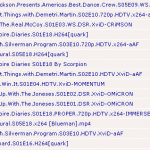TV Networks for the 21st Century
So why am I posting about TV networks? Well, it’s about piracy. Yes, the subject that this blog hardly ever touches upon.
All the talk is about movie and music piracy, but the real trend recently has been towards piracy of TV shows. In fact, there are several BitTorrent websites that specializes only in TV shows, and several release groups that do the same.
This is important because TV networks, which have relied on providing us free content in exchange for broadcasting advertising, is being serious hurt by TV show piracy. And while all the spotlight is on the print media and how its doomed, the traditional TV networks are under threat as well, with declining ad revenues and viewership.
The way things used to work, at least from an outsider’s perspective, was that TV shows were produced and sold to TV networks around the world. Some networks would have exclusivity, which means other networks will have to wait before being able to broadcast the same episode. Then the TV networks would decide the broadcast schedule, and then sprinkle in a splash of ads, and viola, that’s programming. The delay caused by the distributors, and then the further delays caused by TV networks waiting for the best time to broadcast the show, to fit in with their other shows and with rating considerations, sometimes meant that there was a period of weeks, months, and sometimes even years between the first broadcast of the episode (usually in the US), and broadcast elsewhere. And due to deals with TV networks, the show’s release on DVD may even be delayed in the same geographical region, so viewers were left with no option other than waiting, and sometimes hoping, the TV networks would broadcast their favourite show or the new episodes. This gave TV networks a lot of power in controlling what people watched, and when. So they did things like cutting parts from episodes so fit in more ads, or putting in repeats and saving new episodes for a better time. And shows which didn’t have the viewership numbers would get abandoned mid season, usually with no explanation. It’s safe to say that TV networks didn’t really respect their viewers, who really was just a number to them.

The latest episode of TV shows are now easily downloadable on torrent websites, stealing TV viewers by the handful
But then the Internet came along, and instead of waiting for your local TV station to broadcast the latest episode, you could just go to your favourite Torrent destination and grab the latest episode, usually hours after the initial broadcast. And thanks to digital and high definition TV, the quality of the download kept on improving. And of course, no ads! Only the fact that downloads require a bit of technical skill has meant that many viewers still rely on TV, but the tech savvy, young viewers, the most valuable set of “numbers” for the networks, went away and never came back.
And so we now have the current situation. TV networks can’t compete with Torrents, not on speed of delivery, not on the lack of ads, and not even on the choice of shows and backlogs of episodes available. And with subscription television at least offering some timed exclusives, and greater range of shows, where does that leave the traditional TV network? It’s time for change, and I’m not talking about the fairly superficial change from SD to HD.
First of all, speed of delivery. While TV networks could get away with not airing a show months after it first aired in the US, this is no longer acceptable. A huge chunk of TV piracy would be eliminated right away if the same episode of a show is shown across the world at roughly the same time, certainly no more than a day or two’s delay at most. The good news is that TV networks are doing this more often, at least here in Australia, what they call “fast track”. But “fast track” still sometimes means a delay of a week, which in the age of the Internet, might as well be a year.
Ads are important for revenue, and I don’t think it is realistic for TV networks to compete with Torrents by getting rid of ads. However, you should never underestimate what people are willing to do to get good, free stuff. So if the latest episode of Lost is being shown on my local TV channel only hours after the original broadcast, then people might be willing to forgive the ads, and forgo the trouble of finding, downloading and getting the downloaded TV episode to play on their TV. You can’t compete with piracy in terms of price (or in this case, lack of ads), but you can and should always beat them in terms of convenience, and if you’re not winning this battle, then you have no chance at winning the war against piracy.
And that brings us to the choice of shows and access to backlogs of episodes. The Internet age gives people choice, and so instead of accepting some network executive’s idea of programming and schedules, we can make our own via pirated downloads, or via the less illegal method of time shifting involving DVRs. This is really the key to the future of the networks. TV on demand, legal access to every episode of a TV show so far, and a catalog of not just the few dozens shows that a network have time air at the moment, but hundreds and thousands of shows. The kind of convenience offered by being able to view almost anything at any time you want is something people will be willing to pay for, and if not, then willing to put up with unskippable ads for at the very least. And this kind of interactivity will mean better ads, more effective ads that are targeted towards the viewer’s interests, and in the end, more ads that viewers find more acceptable. It’s basically taking Hulu off the Internet, bringing it into people’s lounge rooms, and then expanding the available shows and episode by a large factor, and when this happens, it will be a large step towards making piracy irrelevant.
Whether any of this is realistic or not, I don’t know. There are lots of issues to resolve, like how to rollout such a service (set-top box?), or whether this competes too much with DVD sales. But there was always solutions to problems, but if nothing is done, then the piracy situation will only get worse, despite legal and governmental efforts to interfere. Time to do something.


April 18th, 2010 at 5:28 pm
[…] managed to ramble my way through a mid-week blog post about the future of TV. The focus on fighting piracy has so far centered on stopping the flow of illegal content, and […]
April 23rd, 2010 at 3:19 am
Television and media in general must evolve or be pirated right out of existence.
The media owners are so afraid of losing control of their content they are stangling everyone, themselves and most importantly consumers.
To read my thoughts on media and tech, please check out my blog:
http://kennethlawson.blogspot.com/
Ken Lawson
August 22nd, 2010 at 8:43 pm
[…] and also casual piracy. Those that read this feature will know I’ve long been a proponent of such a system. And of course there are those applications that will only invent itself after the network is in […]
October 24th, 2010 at 6:12 pm
[…] as I posted about in my TV Networks for the 21st Century blog post, the traditional TV network model won’t survive for long, and things needs to […]
December 5th, 2010 at 5:27 pm
[…] that says that “long tail” is where the future is. And I think I touched on this in my TV Networks for the 21st Century blog post, basically the future may be one where people pay very little per download, but they […]
February 26th, 2012 at 8:17 pm
[…] I’ve long been a supporter of Internet based streaming, and the benefits of video-on-demand, I’ve not really had much […]